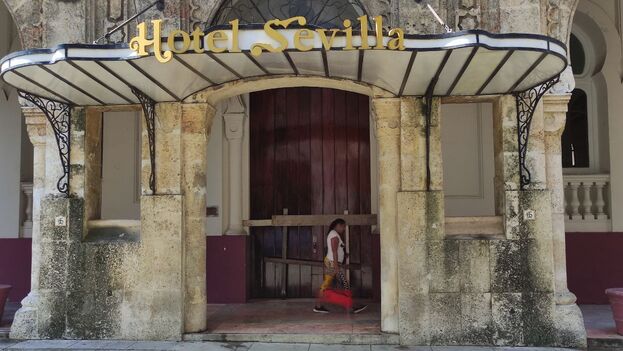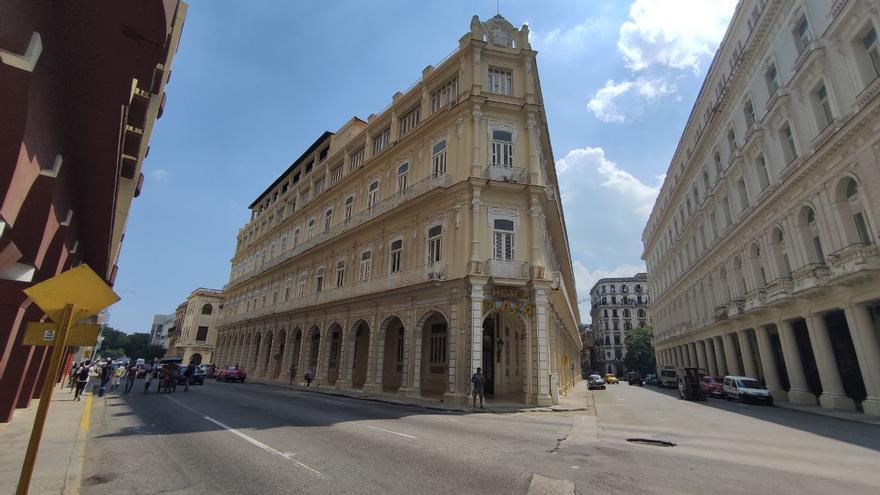
![]() 14ymedio, Havana, 6 May 2023 — With the opening of four new facilities in Havana and Holguín, the Spanish hotel company Meliá aspires to regain its prominence on the Island. During the International Tourism Fair (FitCuba) held this week in the Morro-Cabaña complex of the capital, the executive vice president of the Cuban division of Meliá, Gabriel Escarrer, said that the company intends to consolidate its position and relies on the forecasts of the Cuban Government about increasing the flow of travelers to the country.
14ymedio, Havana, 6 May 2023 — With the opening of four new facilities in Havana and Holguín, the Spanish hotel company Meliá aspires to regain its prominence on the Island. During the International Tourism Fair (FitCuba) held this week in the Morro-Cabaña complex of the capital, the executive vice president of the Cuban division of Meliá, Gabriel Escarrer, said that the company intends to consolidate its position and relies on the forecasts of the Cuban Government about increasing the flow of travelers to the country.
Among the “novelties,” said Escarrer, is the inauguration of the Innside Habana Catedral hotel, an accommodation for tourists who want to discover the colonial city in one of its emblematic spaces, the central Plaza de la Catedral.
They will also take over the management of the historic Sevilla hotel, with 178 rooms, located on the Prado of Havana, which will receive the “Affiliated by Meliá” label. The establishment, inaugurated in 1908, gained worldwide fame after the publication of the novel Our Man in Havana, by the British writer Graham Greene, and the filming in 1959 of the film of the same name in the hotel itself, a few months after Fidel Castro took power.
In August 2022, this newspaper verified the terrible condition of the property, whose doors were closed by a crossbar, although the shops in its commercial gallery, which overlook Prado Street, were open.
Another heritage hotel in Havana, the Plaza — inaugurated in 1909 and one of the most recognizable in the city, located a few meters from Central Park — will become part of The Meliá Collection, a special category that marks the “exclusivity” of certain accommodations of the company and that arrives in Cuba for the first time. However, last year, the gates of the Plaza were also closed by thick wooden crossbars.
Finally, Meliá will take care of managing a completely new hotel, the Sol Turquesa Beach, a colossus of 531 rooms in Holguín, which it presents as the simulation of “a Spanish hacienda of the late nineteenth century.” In addition, it will have “waterfall pools,” “comfortable rooms” and “evocative gastronomic proposals.”
In a note on its blog, the company also anticipated the upcoming opening of the Meliá Trinidad Peninsula and noted that, since last March, Varadero has the brand new Sol Caribe Beach. In addition, it plans to “refresh” its rooms in different hotels that it already manages in the capital and will improve, the company says, the menu — hoping to incorporate Japanese and Tex-Mex restaurants — and the tours of Old Havana.

The Jagua hotel, in Cienfuegos, will be restored in 2024 and will be renamed as the Innside Cienfuegos Jagua. Other remodelings on the list are those of Paradisus Varadero, Paradisus Princesa del Mar, Paradisus Río de Oro, Meliá Las Américas, Meliá Varadero, Sol Palmeras and Tryp Habana Libre.
Meliá’s power on the Island translates into numbers: “More than 14,000 rooms in 38 hotels,” calculated the director of Communication of the company’s Cuban subsidiary, Maite Arteida, in an interview for the medium Excelencias Cuba.
Artieda explained that Meliá is directing its offers, above all, to Canadian tourists. “Canada remains the leader in terms of tourism to Cuba, and then in Europe we have important countries like Germany, Spain and Portugal. The latter two, for the summer, continue to be our priority markets,” he said.
He pointed out that Meliá has covered all the important destinations on the Island, including Havana, Cienfuegos, Trinidad, Santiago de Cuba, Holguín, Varadero, Cayo Coco and Cayo Santa María. Asked if the company was planning new investments, he detailed the plans for the Meliá Trinidad Peninsula — the first to open in that city: “It is a hotel that faces the sea, overlooking the Escambray mountains, very close to the city of Trinidad, which will offer travelers the complete experience of sea, mountains and discovery of that culture that is unique in Cuba.”
“We are a hotel chain, but what we really do is to create experiences through our different brands,” he concluded.
Meliá, based in Palma de Mallorca (Spain) and present in Cuba for more than 30 years, has seen its situation complicated not only by the coronavirus pandemic, which put international tourism in check, but also by multiple lawsuits after the reactivation in 2019, by then President Donald Trump, of Title III of the Helms-Burton Law. Some 14,000 judicial proceedings were launched against the companies that had “trafficked in property confiscated by Fidel Castro’s regime,” including Meliá.
For the Cuban Ministry of Tourism, Meliá’s new move is good news. Juan Carlos García Granda, head of the sector, again announced the entry of 3.5 million foreign visitors to the Island as a target for 2023. The forecast, made like the one a year before — when it promised 2.5 million tourists — had to be rectified again and again during 2022, which ended with just 1.7 million.
The slow recovery of the sector, the global disinterest in the Cuban destination, misdiagnosis of the problems and the preference of tourists from allied countries such as Russia for other vacation destinations such as the Dominican Republic, are several of the factors that deny García Granda’s optimism. The only thing that does not stop despite the crisis, as demonstrated by Meliá’s new bets, is the frantic construction of hotels.
Translated by Regina Anavy
____________
COLLABORATE WITH OUR WORK: The 14ymedio team is committed to practicing serious journalism that reflects Cuba’s reality in all its depth. Thank you for joining us on this long journey. We invite you to continue supporting us by becoming a member of 14ymedio now. Together we can continue transforming journalism in Cuba.
